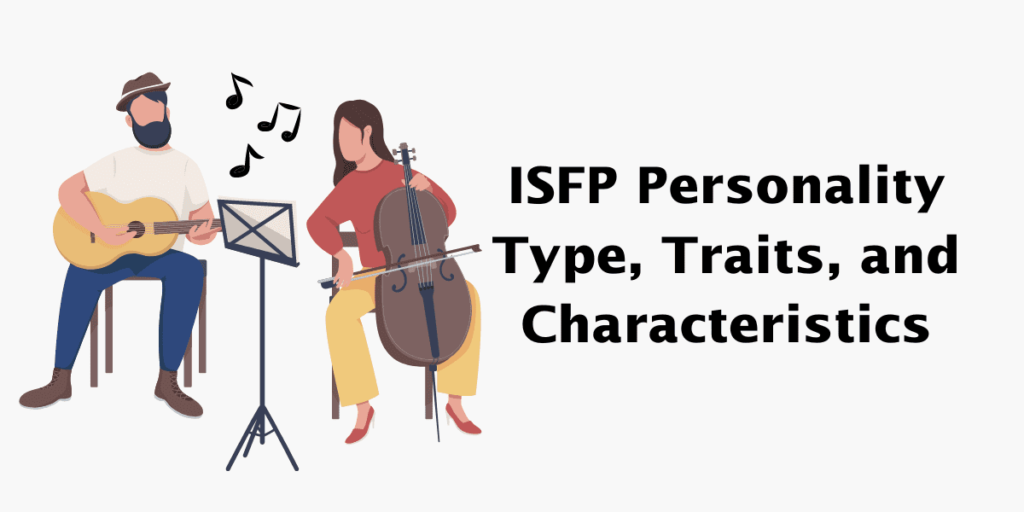
ISFPs are characterized as being artistic, loyal, and in pursuit of harmony. Their primary function is Introverted Feeling which allows them to know what they value and make judgments based on these values. They strive to connect with others who share similar ideals. In turn, their auxiliary function is Extraverted Sensing which makes them tuned into earthly pleasures and stimulations – they have a keen eye for aesthetics (“Portrait of an ISFP”). Essentially, they live in a world full of sensation possibilities and have strong personal values that they constantly seek to integrate into their lives.
ISFP Traits
- Keen awareness of their environment
- Live in the present moment
- Enjoy a slower pace – they like to take time to savor the present moment
- Dislike dealing with theory or abstract thought, unless they see a practical
application - Faithful and loyal to people and ideas which are important to them
- Individualistic, having no desire to lead or follow
- Take things seriously, although they frequently appear not to
- Special bond with children and animals
- Quiet and reserved, except with people they know extremely well
- Trusting, sensitive, and kind
- Service-oriented; they’re driven to help others
- Extremely well-developed appreciation for aesthetic beauty
- Likely to be original and unconventional
- Learn best with hands-on training
- Hate being confined to strict schedules and regimens
- Need space and freedom to do things their own way
- Dislike mundane, routine tasks, but will perform them if necessary
ISFP Strengths & Weakness
ISFPs tend to be drawn towards careers that allow them the liberty and independence to express their own goals. They favor flexibility above all else, as strict timetables can leave them feeling stifled. ISFPs are generally most comfortable with a hands-on approach, since abstract thinking is far from their strong suit; objective systems don’t pose much appeal either – they prefer subjectivity instead, which makes music and art highly attractive pursuits for these individuals.
Strengths
Very aware of their environment
Practical
Enjoys hands-on learning
Loyal to values and beliefs
Weakness
Dislikes abstract, theoretical information
Reserved and quiet
Strong need for personal space
Dislikes arguments and conflict
ISFP Career Paths
ISFPs often excel in careers that deal with practical, real-world problems. They prefer to focus on the present, so jobs that offer a great deal of personal freedom and autonomy are especially appealing to them.
- Artist
- Musician / Composer
- Psychologist / Counselor
- Librarian
- Designer
- Social Worker
- Teacher
- Doctor
- Child Care
- Writer

Dealing With ISFP's
Friendships: ISFPs are cordial and easy to get along with but usually require time getting to know you before they fully reveal themselves. You can show your ISFP friend support and acceptance by being supportive and accepting of who they are. ISFPs are known to be friendly and carefree, but they can also get very intense. It’s important to remember that sometimes your ISFP friend just wants to relax in their own space and won’t want company.
Parenting: Children with the ISFP personality type are often perfectionists and can be hard on themselves. They set high standards for themselves and might not see their own skills and talents as valuable. As a parent, you can help your ISFP child by teaching them to treat themselves kindly and show appreciation for what they do well.
Relationships: If you are in a relationship with an ISFP, it is essential that you take the time to understand their feelings and needs as they will often not express them themselves. When making decisions together, be sure to listen to your partner’s point of view and give their feelings just as much consideration as your own.
Working with ISFP's
- ISFPs can see the positive in everyone but may need positive feedback for themselves.
- Do not criticize the ISFP’s ideas and opinions for they do not respond well to negativity.
- Assign projects that foster creativity without deadlines.
- Approach the ISFP by being direct and honest.
Famous people with ISFP
Famous ISFPs include
- Cher
- Barbra Streisand
- Frida Kahlo
- Jacqueline Kennedy Onassis
- Bob Dylan
- Wolfgang Amadeus Mozart
- Jimi Hendrix
- Rihanna
- Michael Jackson


